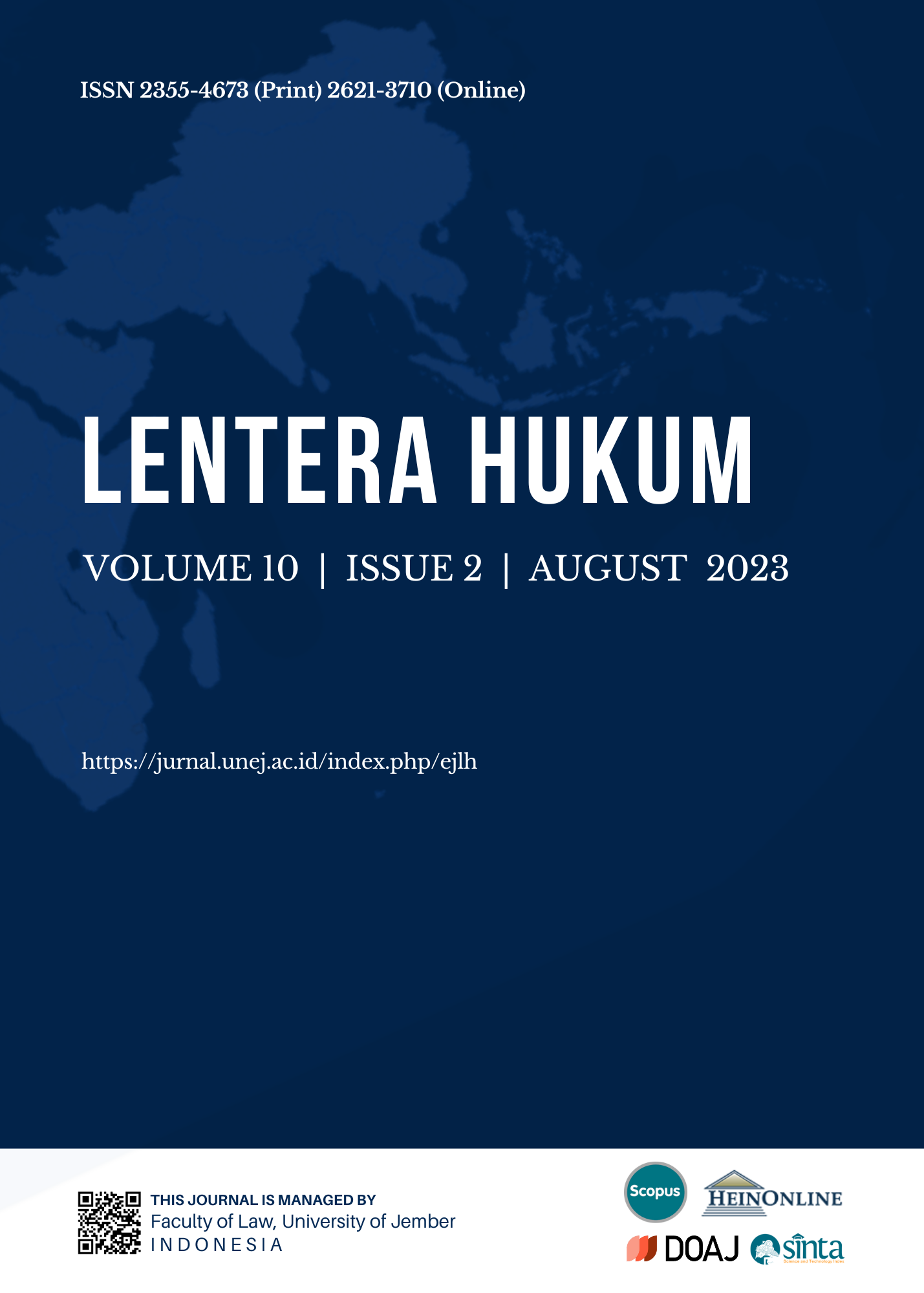Shareholders' Claim for Reflective Loss in International Investment Agreement through ISDS Arbitration Practice
DOI:
https://doi.org/10.19184/ejlh.v10i2.39534Abstract
Shareholders’ claim for reflective loss appears to be commonly accepted by the Investor-State Dispute Settlement (ISDS) tribunals. Several international investment agreements (IIAs) have construed the condition of losses or damage under IIA to address the shareholder reflective loss (SRL) issue. Nonetheless, through the ISDS decision, the interpretation appears to be disparate. This article will aim to analyze the status of SRL in IIA through conditions of losses or damages as investment dispute characteristics and IIA text formulation to limit such conditions in addressing SRL issues through juridical normative and comparative study with a descriptive-analytical characteristic. Foreign direct investment regimes driven by the IIA show how important the IIA’s role is in providing adequate protection of investment including dispute mechanisms set through. The author will use the juridical and comparative methods by reviewing the existing statutory and case laws. The condition of loss or damage under IIA also appears to cover SRL. The limitation through the scope of allowed claims regarding whose losses, have been interpreted by several tribunals to limit a direct claim for SRL. However, the interpretation seems to be inconsistent with the other tribunals. An explicit text formulation and applying the loss-based general rule into IIA will then help to address consistent and genuine outputs of the applicable rule to limit the condition of losses or damage pertaining to the claim for SRL. In conclusion, the condition of losses or damage led the tribunal to allow the claim for SRL, yet through a limitation of the condition, the claim for SRL will be construed with specific requirements and procedures to avoid intersectoral issues. State parties in negotiating IIA are suggested to consider limiting the condition of losses or damage by adopting text formulation that led the ISDS tribunal’s interpretation to a genuine meaning of the applicability rule which the parties intended to, specifically, regarding investor’s right to claim SRL. Thus, the risk of harm that the host state suffers will be avoided.
Keywords: Foreign Direct Investment, International Investment, International Law.
Downloads
References
Ihering, Rudolf Von, Law As a Means to an End (Boston: The Boston Book Company, 1913).
Kinnear N, Meg, Investment Disputes under NAFTA an Annotated Guide to NAFTA Chapter 11 (Netherlands: Kluwer Law International, 2006).
Sornarajah M, International Law on Foreign Investment (Third Edition), third ed (Cambridge: Cambridge University Press, 2010).
Vanhonnaeker, Lukas, Shareholders’ Claims for Reflective Loss in International Investment Law (Cambridge: Cambridge University Press, 2020).
Bottini, Gabriel, "Indirect Claims under the ICISD Convention†(2008) 29:3 U Pa J Int’l L 563–639.
KOH, Parlie, “The Shareholder’s Personal Claim: Allowing Recovery for Reflective Loss†(2011) 23 Singapore Academy of Law Journal 863–889.
Korzun, Vera, “Shareholder Claims for Reflective Loss: How International Investment Law Changes Corporate Law and Governance†(2018) 40:1 University of Pennsylvania Journal of International Law 189–254.
Kyriakou, Panagiotis A, “Mitigating the Risks Entailed in Shareholders’ Claim for Reflective Loss: Sugesstion for Investment Treaty Reform†(2018) Journal Of World Investment and Trade 19 698–721.
Lee, Jae Sung, “Shareholder Claims for Reflective Loss in Investor-State Dispute and Reform Options†通商法律, 55–91.
Merkouris, Panos, “Interpreting the Customary Rules on Interpretation†(2017) International Community Law Review 126–155.
Ninne Zahara Silviani, “Interpretasi Perjanjian Internasional Terkait Historical Rights Dalam UNCLOS 1982†(2019) 6:2 Jurnal Selat 154–171.
Pandu Rizky Putra Pratama & Prita Amalia, “The ISDS Mechanism and Standards of Protection in the Investment Treaty†(2020) 7:2 Jurnal Lentera Hukum 137–154.
Prita Amalia & Muhammad Lazuardy Thariq Makmun, “Multinational Corporations’ Investments Made Through Its Subsidiaries Under the Latest Generation of Investment Treaties†(2021) 19:1 Indonesian Journal of International Law 113–135.
Shapira, Giora, “Shareholder Personal Action in Respect of a Loss Suffered by the Company: The Problem of Overlapping Claims and ‘Reflective Loss’ in English Company Law†(2003) 37:1 The International Lawyer 137–152.
Waibel, Michael, “International Investment Law and Treaty Interpretation†(2011) from Clinical Isolation to Systemic Integration 29–52.
Damgaard, Jannici, “Chart of the Week: Foreign Direct Investment: United States is World’s Top Destination for Foreign Direct Investmentâ€, (7 December 2022), online: Chart of the Week: Foreign Direct Investment: United States is World’s Top Destination for Foreign Direct Investment <https://www.imf.org/en/Blogs/Articles/2022/12/07/united-states-isworlds-top-destination-for-foreign-direct-investment>.
Gaukrodger, David, Investment Treaties as Corporate Law: Shareholder Claims and Issues of Consistency" (OECD Working Papers on International Investment, 2013).
Pohl, Joachim, Dispute Settlement Provisions in International Investment Agreements (OECD, 2012).



